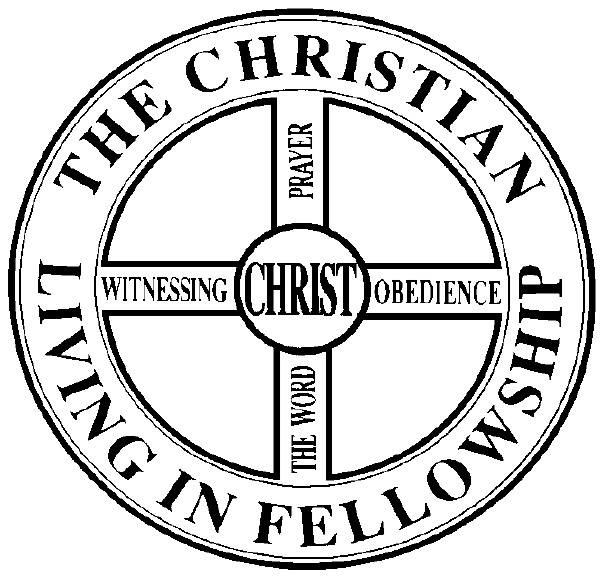
Knowing the Lord
The foundation of the life of a Christian is his or her relationship with Christ. Building that doesn't require a seminary or Bible school degree, but the patient discipline of meeting daily with God. There are no shortcuts to a deep walk with God but to diligently seek Him out every day, learning a little bit more of Who He is and allowing His likeness to transform us a little bit more as we travel through our day. Just like it takes years of spending regular time with your friend to know him or her well, so it is with building our relationship with God.

I was taught to think of my walk with God in terms of a Wheel Illustration*. It pictures Christ at the center and heart of our life, our driving and directional force. Our goal in life is to grow in Christlikeness, such that when people see us in the course of everyday life, they see Jesus Christ who richly dwells within us. The keys to being so transformed by Christ include a firm grasp of God's Word, our Obedience to His revelation, true conversation with Him through Prayer and an active life of Witnessing. Jesus describes these fundamentals in John 15; Ezra is a great example of a man who modeled them (Ezra 7:10). All aspects need to be growing in balance. To forsake one in favor of another makes for a lop-sided wheel—and a life out of balance.
Spending daily time with the Lord, we believe should include three of these aspects for growth: reading and meditating on God's Word, applying His Word in some act of obedience for the day and conversing with Him in prayer. Such a meeting with the Lord is often referred to as a Quiet Time or Devotional Time.
Three things are needed for a successful Quiet Time: Set aside a daily PERIOD of time to spend with God, both a specific time of day (Jesus and King David met the Lord in the morning before the day's activities began, see for example Mark 1:35 and Psalm 5:3) and an approximate amount of time for your reading and prayer (perhaps 15 to 30 minutes as time allows). It is also important to select a regular PLACE (Mark 1:35) to meet the Lord. Establishing both of these beforehand will help you protect the time you have with the Lord, very much like making an appointment to meet a friend. Once you set the time and place, you're less likely to allow distractions or interruptions. Finally, we strongly encourage you to have a PLAN for reading God's Word regularly and consecutively. Our goal is to allow God to speak to us from ALL of His word, not just our favorite parts, or the part we think we need most at any particular time. The Lord may have something very special to say to us that we would otherwise miss if we only stuck to our favorite passages or skipped around. Reading consecutively also helps us see concepts develop through the pages of Scripture, giving us a fuller understanding of them.
If you don't already have a reading plan, we recommend you start with the Gospel of John. When you finish that, keep going through Acts and on through Revelation. When finished, we usually recommend restarting the New Testament beginning with Matthew. After completing that again, we encourage disciples to start from Genesis and read straight through to Revelation, challenging them to repeat that each year. If you're just getting started, begin with one chapter a day. If you work up to three chapters a day, you'll be able to read through the whole Bible in one year—as long as you read seven days a week and don't miss any days along the way. Reading four or five chapters a day will take you through every word of Scripture in 10 months or less, even if you miss a day here or there.
However, our goal is not simply to read the words of God, but to be changed by them—to know God better and to know better how to walk in His ways. That requires meditation and distillation. As you read through your chosen passage, underline or somehow note key points, new ideas, challenges or encouragements. These are not necessarily things that all Christendom considers vital, but things that jump out to you. The Lord is pointing them out to you personally. When you finish your passage, pray over the things the Lord impressed upon you and ask Him which one He'd like you to focus on that day. Prayerfully meditate on that item, seek to understand it in context, then consider how you can apply it to your life that day. We urge you to take notes, both on what you learned that day and how you plan to apply it. Recording our thoughts helps us clarify, crystallize and confirm what we've learned from the Lord that day. You'll see that applications usually fall into two categories: Those that inform our relationship with God and those that instruct our relationship with other people.
Every believer should have a Quiet Time as the foundation of their life of service. This is just the Word and Obedience sides of a Quiet Time. Prayer is another key aspect of our relationship with Christ. And in truth, there is much more needed to engraft the Word of God deeply into our lives so that it transforms us as fully as possible, but those will have to wait for another day.
Resources
- Personal Reading Record - A tool to help you keep track of where you've read and where to read next
- Bible Reading Highlights Record - A tool to help you record your thoughts and applications when you read the Word
- The Timothy Training Workbook - A printable (front & back) discipleship notebook written by veteran Navigator missionary and founder of Training Evangelistic Leadership, Roy Robertson
* Courtesy of Roy Robertson and Training Evangelistic Leadership

